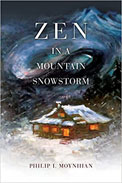
 |
The novel begins like a horror film as two weary travelers seek refuge from a storm at a secluded log cabin. What ensues is more like science fiction, becoming so much better than the characters anticipate that they can barely believe the outcome. Their cell phones not working during a drive in a mountain snowstorm, Brian and Anne pull over to ask the owner of a log cabin to use his landline. He insists they stay overnight. Over dinner and a fire, Brian, Anne, their host, Willy, and his other guests discuss their pasts, their work lives, and solutions for the planet's future.
How the characters conduct themselves models an ideal for sifting and sharing information in this modern, knowledge-based age. Even as strangers, they all help prepare a vegetarian meal together. They take turns speaking, asking each other for term clarifications, and thanking one another for learning something new. Explanations break down heady concepts into layman's terms for easy digestion. Each subsequent speaker responds directly to previous comments. Their fields of study—aerospace engineering, computer science, quantum physics, ecology, medicine, and political analysis—are given equal treatment, as are men's and women's voices.
In their care for the topics they discuss, from climate change to space exploration to Eastern philosophy, the conversation transcends, taking on a life of its own and changing its participants. The unlikely coming together of these minds is just short of a miracle. Willy proposes a new outlook on the future, upon which the others agree and add their insights. Like the interdisciplinary approach Willy describes, this novel rises above categorization. It comes across as part thriller, part science fiction, part journalism, and part how-to book. But no matter its genre, no reader is likely to leave uninformed or unmoved by the ideas explored.
RECOMMENDED by the US Review